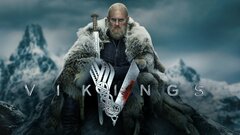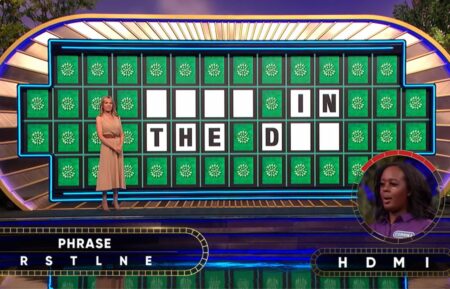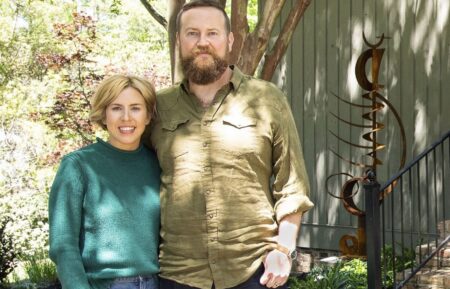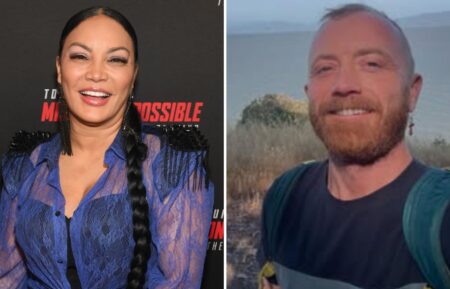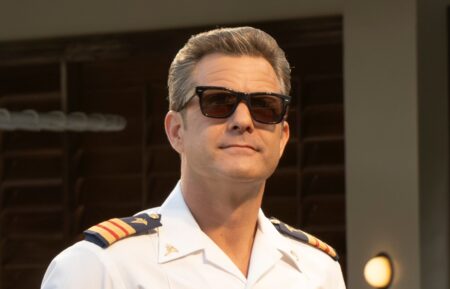Death, Birth and Betrayal: Vikings Creator Says This Was ‘Most Difficult and Emotional’ Episode So Far
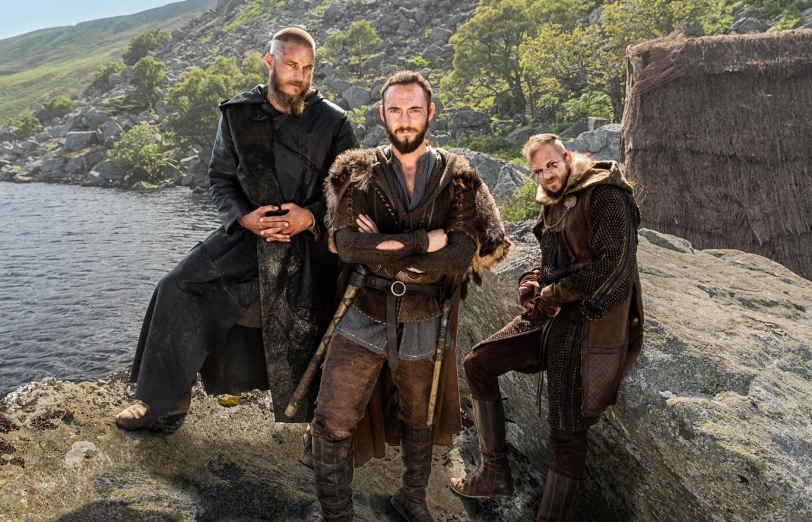
Major spoilers from the March 26 episode of Vikings ahead!
***
The afterlife is getting a little too crowded for Vikings fans. A second major character died this season when former monk Athelstan (George Blagden) was murdered by shipbuilder Floki (Gustaf Skarsgard.) Only two weeks ago, viewers saw the once powerful and still savvy Siggy (Jessalyn Gilsig) drown after saving Norse king Ragnar’s (Travis Fimmel) sons from a frozen lake.
But no one was there to save Athelstan. His death will profoundly affect Ragnar, who trusted him, loved him, and relied on him for counsel.
Athelstan became an instant fan favorite in Season 1 when Ragnar captured the young monk and brought him back to the town of Kattegat in Scandinavia. Athelstan – smart, innocent, kind, generous – lived with Ragnar’s family. At first terrified of the pagan Vikings he slowly became Ragnar’s friend, trusted advisor, and teacher of Christianity and the larger world. He embraced Viking ways by learning to fight, engaging in battle and indulging in all the vices off-limits to monks. Yet he always grappled with his faith.
This season Athelstan finally slept with Judith (Jennie Jacques), who is married to King Ecbert’s (Linus Roache) son Aethelwulf (Moe Dunford.) Athelstan has spent time advising Ecbert in Wessex, earning the king’s respect and trust. He’s also fallen in love with Judith. Yet when faced with a choice, he returned to Scandinavia with the Vikings. Shortly before his death he had a vision of God and was born again into his Christian faith.
The monk’s death was by far the biggest development in “Born Again,” but the entire episode was packed with major milestones and sets up some things that will pay off in Season 4. Vikings creator Michael Hirst talked to us about Athelstan’s murder and more.
Was it always the plan to have Athelstan die this way?
It didn’t become clear until I was writing Season 3. I had to resolve Athelstan’s spiritual crisis or I would start repeating myself. I had to decide how to do it in the most powerful way. When he left Wessex, he walked away from Judith and chose the Vikings. All those years when he was first captured and taken to Kattegut, he’d prayed for a sign from God. God had never given him a sign or spoken to him, so he believed that he was abandoned by God. I thought, Wouldn’t it be cool if the moment he threw in his lot with the pagans, God speaks to him?
Was it cruel to fans to kill off yet another beloved character so soon?
If you think of all the Vikings deaths, this one is different. It’s positive. It’s joyful. He’s released from agony. Of course Athelstan knows it’s coming. He’s not surprised when he sees Floki. He embraces martyrdom joyfully. It’s a very different death than any we have seen.
Did you ever question your choice?
I was convinced this had to happen and was the best resolution to the story. Then I realized I was going to lose not only one of my favorite characters but one of my favorite actors and I was horrified and wrote George a five-page e-mail explaining the logic. I do want people to know it was the single most emotional and in some ways difficult episode that I’ve written so far in the whole show. It’s a defining episode in many ways. And the most moving to me. And I lost a great friend myself.
What was George Blagden’s reaction?
George, I am sure, was surprised. Possibly a little upset but he was too much of a gentleman to say so. In fact he was gracious. He’s made the role his own and he’s grown as an actor during the show. Athelstan wasn’t an afterthought but he was initially a device – my way of bringing a contemporary largely Christian audience into the pagan world. Soon he became a more rounded character, and soon after he became a living person to me. It was without a doubt the most difficult and emotional episode I’ve had to write.
Were you on set for the death scene?
Yes. I saw his demise and George was never better than in those scenes. They were a triumph for him too as an actor. He really came of age.
Did Athelstan really have this experience, communicating with God through this beam of blinding light, or was it just his perception of a natural phenomenon?
I like to leave those questions open. He saw the light. Nobody else saw it. And of course it is like St. Paul’s epiphany when he was struck blind as a tax collector. So I was thinking of that as well. But when Floki feels like he has been given a signal by the gods, when his carving starts to bleed, nobody else sees that. Only he sees that. So you can either say it’s psychological or it’s true. And for me, a lot of religion is like that. You can’t judge it in the same way you judge other things. Is Christ in the tomb when He rises from the dead or is that a fantasy? It depends on who you talk to.
Athelstan was a man of deep faith. So is Floki. Are they two sides of the same coin?
If you think of Floki as pagan fundamentalist, then the Christian fundamentalist is really Ecbert’s son, Aethelwulf.
Another shocker was that Aethelwulf and his father betrayed Ragnar and killed the Viking settlers in Wessex. Floki says the Norse gods allowed this to happen because the Vikings allied with Christians. It was Ragnar’s choice but still Floki blames Athelstan and it drives him to kill. Why?
Floki has a fascination with Athelstan. He hates him but he can’t leave him alone. Something about Athelstan fatally attracts Floki. It’s not a surpise to Athelstan when it is Floki who kills him. Athelstan probably knew Floki was his fate.
What are the implications for Floki now that he has committed this murder?
Floki’s a guy who is always filled with divisions. He argues about not regretting what he has done because he believes in it—yet he does love Ragnar. He knows the effect of it on him. So he’s a divided character. It does have huge consequences further down the line. Wait until you see Episode 10.
But no one knows Floki did it, at least not yet, right?
Right. Most of the Viking community would be against Athelstan anyway. There is the scene in this episode where [Ragnar’s warrior brother] Rollo (Clive Standen) talks to Ragnar’s son Bjorn (Alexander Ludwig) and Bjorn shares his feelings and fears about Athelstan. He’s afraid Ragnar is getting too interested in Christianity. That word goes ’round the community. It is possible to believe that any number of people could have murdered Athelstan. It was only Ragnar’s protection that to some extent had made him safe.
Athelstan dies, but miles away, Judith gives birth to their son and is arrested for adultery. What does the church’s prescribed punishment—having her ears and nose chopped off – say about how humans interpret the word of God?
There are there strange things going on. The brutality of the Christian religion. The brutality of Floki. It resonates with stuff that’s happening in the world today.
Judith loses one ear before shrieking her confession that Athelstan is her son’s father. Ecbert halts her punishment saying that the conception must be part of God’s plan because Athelstan was such a spiritual man. Is the child as special as Ecbert thinks he is?
He is a very special child because he will grow up to be one of the most famous kings of English history, Alfred the Great. Historically speaking he ended up fighting against the Vikings, and the Vikings he fought against were Ragnar’s sons. So Egbert is quite right in guessing that there is an extraordinary future for this child. The presence of Alfred continues to connect Ecbert to Athelstan. Athelstan is dead but he will continue to live on in several ways, to be present in the drama for quite a long time. He’s too important just to vanish from people’s lives.
So he lives on in this child. How else does he live on?
I can’t tell you. Just believe me. [Laughs]
Will we see more of Judith and the child?
Yes, we will see more of Judith, more of Ecbert, more of Wessex. In the end, Ragnar’s story circles back around to Wessex. Jennie Jacques, she’s just a great actress. I want to keep them very present, very much alive.
So can you hint about where Alfred’s story goes? For those of us who, ahem, may not be so up on our British history?
What actually happened, will happen. As a young boy of about four, Alfred, accompanied by a couple of people, was sent off on the pilgrimage route to Rome, which was one of the most dangerous routes in the world. He went to meet the Pope. He was blessed by the Pope, so his sense of him being a very important person at the age of four was recognized in Rome. What a great story that is. I can’t wait. We’re showing Paris in the later half of Season 3 and at some point we’ll be in Rome.
So we are going to Rome in Season 4?
Yes.
Bjorn’s lover Porunn (Gaia Weiss) also gives birth—to a daughter. They name the child Siggy. Will this child bring changes beyond what you might expect from any new bundle of joy?
Oh I can’t tell you. No. That’s a big question too. Not necessarily how the child affects the community, but it affects the parents. It affects them in a very powerful way.
Will the child have Siggy’s spirited personality? Or is she a reincarnation of Siggy?
I can’t say.
Ragnar alone carries Athelstan’s shrouded body to a hilltop so he can bury him, “the closest I can get you to your god.” He has a heartbreaking monologue where he talks with Athelstan and says good-bye. Tell me about writing that scene.
It was a very moving scene. Travis and I worked on that scene together. Travis loves those personal scenes. We now have regular meetings to go through the script. He makes copious notes. He’s very, very engaged and he’s very intelligent and we talk very intensely. We do it line by line. He loved that scene. His favorite scene up to now was the scene in Season 2 when he talked to his dead daughter on the beach. That had been his favorite scene. It’s intimate, personal, emotional. We wanted that for the burial scene of Athelstan. We knew he would engage with that. And of course it just enriches the performance. The more input he’s had in the shaping of it.
After Ragnar buries Athelstan he says, “Forgive me my friend for what I’m about to do.” What does he mean?
He just means, whatever morality, particularly Christian morality, he’s learned through his connection with Athelstan, he’s probably going to ignore that.
He still puts Athelstan’s cross around his neck, though.
He does. So it’s not entirely true. He’s conflicted afterwards because Athelstan’s spirit doesn’t leave him alone either. I won’t say any more than that. [Laughs]
So there’s a chance we may not have seen the last of George?
Yes.
What was the significance of Ragnar shaving his head at the end of the episode?
When Athelstan first goes to Kattegat, he’s traumatized and afraid and he’s lost his god. His hair has grown out, so he’s lost that tonsure [the shaved spot on the top of a monk’s head.] He steals a knife from Ragnar and tries to shave his head to get the tonsure back. It’s a bloody, horrible affair. Ragnar shaving his own head is a tribute to Athelstan, but it’s also a way of saying he’s a changed man. Athelstan’s death has a profound effect on Ragnar. He becomes a lonelier, darker figure who is more suspicious of people.
Now that Athelstan is gone, who’s the sympathetic voice of Christianity on the show now? Is it Judith?
Well…there’s a new character who is going to appear in Season 4 who will do that.
Discovery’s new reality series follows fearless fishermen as they search for the largest fish in the world: The Atlantic Bluefin Tuna. The monsters, which can weigh in at 1,500 pounds and 15 feet long, lurk deep in the North Atlantic’s hallowed waters and are worth over $10,000. With only one chance to catch this valuable prize, these fishermen have to be as strong and stealthy as their prey.
Catching Monsters, Series premiere Friday, June 5, 10/9c, Discovery Channel
From TV Guide Magazine
How 'Countdown' Recruited Jensen Ackles to Go Full 'Die Hard'
Countdown boss Derek Haas talks creating the character around Ackles, and the cast teases the “Avengers”-like team of the crime thriller. Read the story now on TV Insider.


